These impressions are based on playing through the first two scenarios of Divinus, a prototype copy of which was provided by Lucky Duck Games. There are very minor spoilers for the first two scenarios included.
The gods are at war, Greek and Norse pantheons colliding in a maelstrom of carnage and death. But war brings opportunities, and the occasional god meeting its maker (is that themselves?) means there’s a new space in the divine roster. Perhaps you, a humble demigod, can step into those dead deity’s shoes and become a god yourself?
Divinus is a competitive, legacy, digital hybrid, dice-rolling, tile-laying board game for 2 to 4 players, and it’s currently live on GameFound. That’s quite a mouthful so let’s unpack that a little: across a story spanning 12 scenarios (individual games) you’ll roll dice and place tiles to score divine favour with the two battling pantheons, hoping to end up as the most ‘favoured’ player and ascend to become a new god. Along the way you’ll make changes to the dice, tiles and anything else Divinus throws your way, using a companion app that remembers all your earlier actions and evolves the storyline based on your decisions.
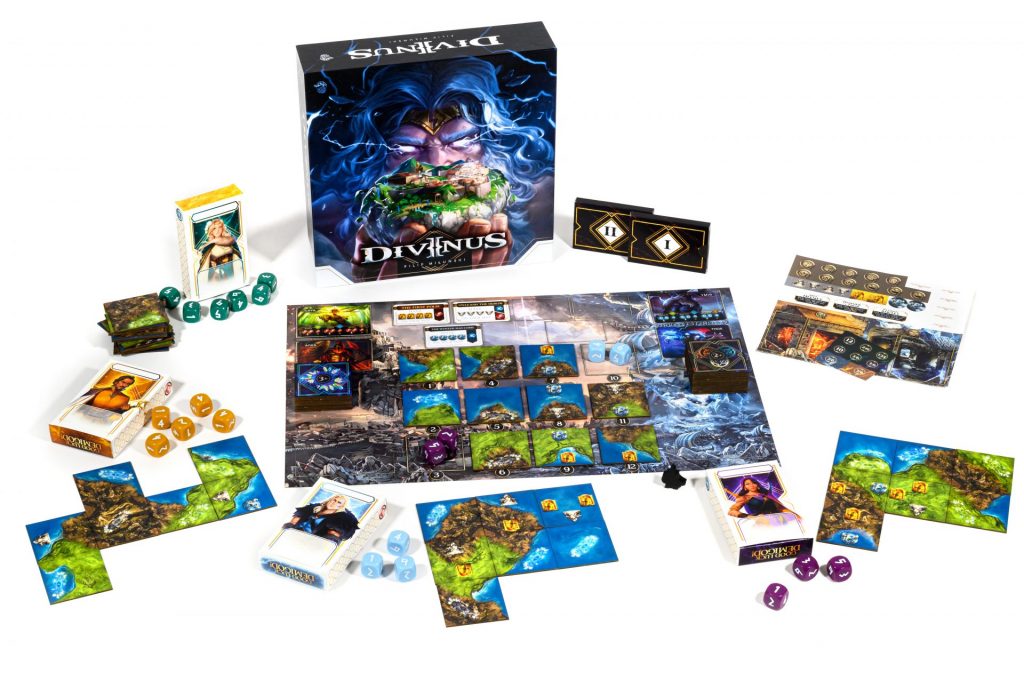
Divinus is a culmination of many of the interests that Lucky Duck Games holds dear. We’ve seen their fascination with the Norse gods before with Vikings Gone Wild. The company has led the way in app-driven board games with Chronicles of Crime. And Divinus follows hot on the heels of their previous legacy game Destinies. So have Lucky Duck Games learned from all their experiences or is Divinus shaping up to be less than divine?
The quick answer is that Divinus shows a lot of promise, cleverly blending satisfying gameplay with genuinely involving narrative.
Mechanically Divinus presents a solid foundation. On a turn you’ll select some of your dice and use them to choose one of the displayed landscape tiles from the main board. Tiles are laid out next to the numbers 1 through 12, and to take a tile you simply need your dice to combine to produce the value next to the tile. Enjoyably you can also add and subtract numbers so there’s a lot of flexibility, provided you’re happy to combine several dice for a single tile and potentially waste more turns resting and reclaiming your dice than your opponents.
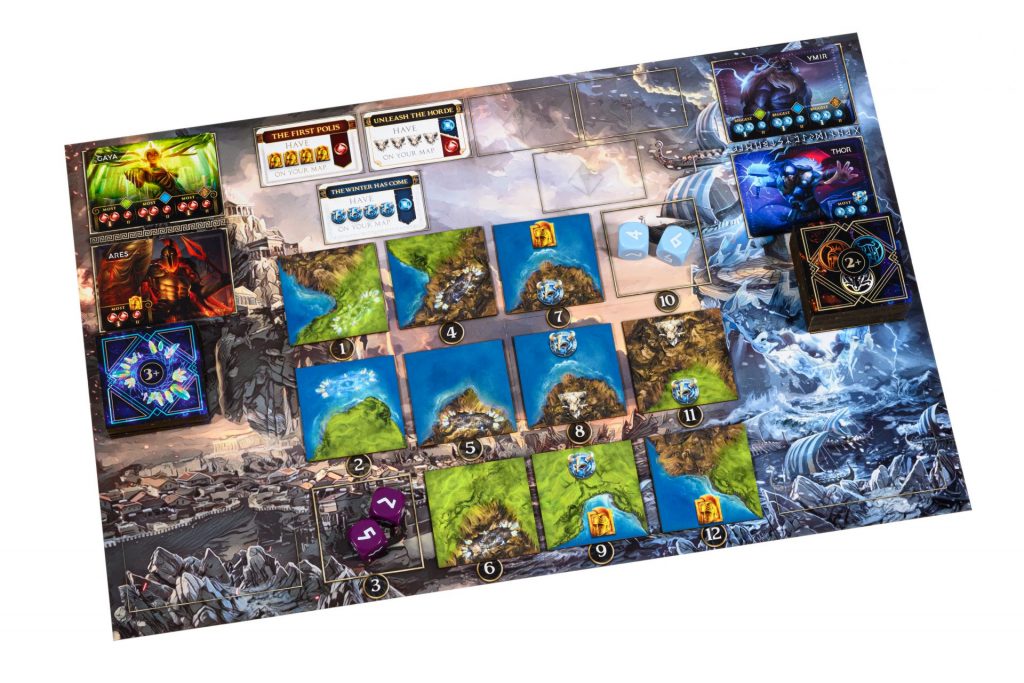
Tiles depict one to three types of terrain (seas, mountains and plains, a little like Isle of Skye) and over the course of the game you’ll build a 4×4 grid, making sure that tiles are placed with terrains matching. The tiles also have Greek, Norse and Barbarian symbols (and will later have other additions) which you’ll be aiming to collect, balancing sometimes competing goals of collecting symbols, creating large areas of each terrain type as well as multiple different areas of terrain types.
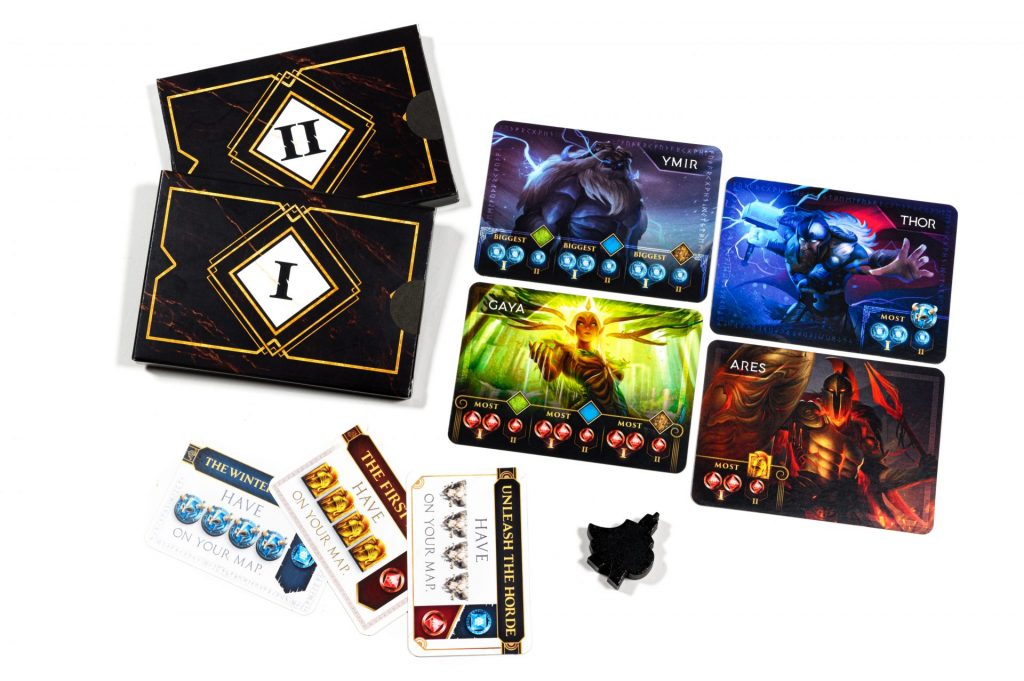
That’s about it for the first scenario. Even without any of the legacy elements it’s a quick, enjoyable game, perhaps not ground-breaking but very competent. As a fan of the tile laying genre I’d happily play the basic game of Divinus as a quick evening entertainment after a long stressful day at work. Some may feel it’s too simple but history has shown that the best legacy games tend to start from a simple framework and build from there. From what’s presented in just the first two scenarios it’s a starting point with a lot of potential.
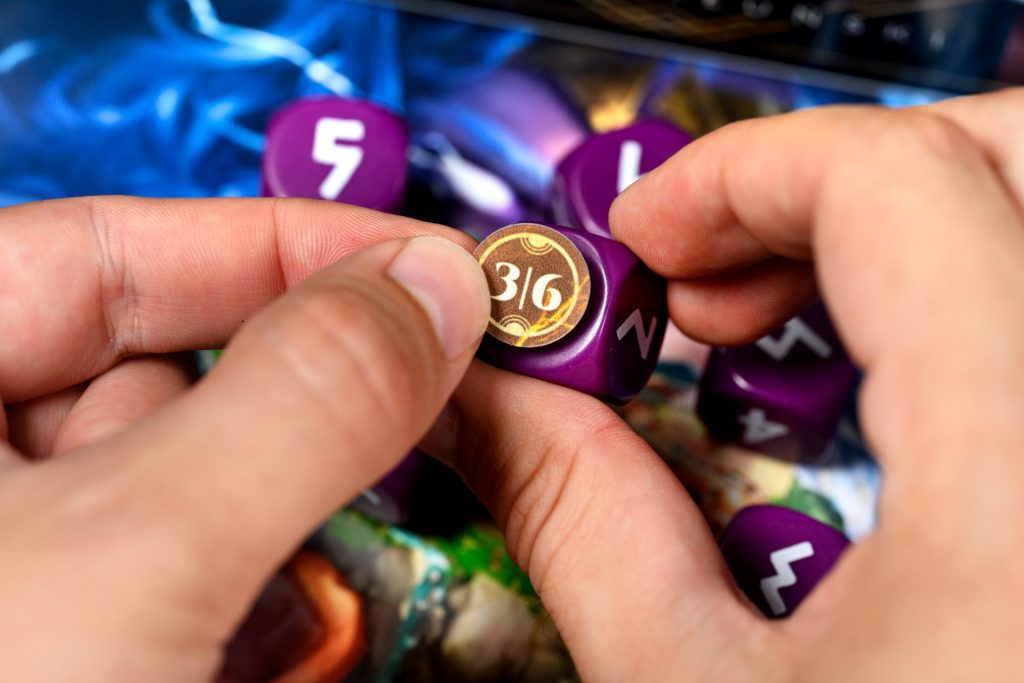
Partly the game’s legacy elements are mechanical, additions to the turn-to-turn processes and the options available to the players. Two scenarios doesn’t leave much room to introduce a lot of new rules but the additions have been interesting, providing yet another conflicting set of desires to distract you – do you aim to win the game or upgrade your character and components, given that these will give you advantages in later games? The trouble is, focusing on upgrading will see you fall behind, both in the current game and with your cumulative score across the whole campaign (something that the Divinus puts a lot of importance in).
Where Divinus really shines, however, is in the integration of a surprisingly compelling story. You might think a game of placing terrain tiles would struggle to feel anything other than abstract. Yet you’d be wrong.
Take the Quests you’re racing to complete during each game. Successfully achieve the objective and you’ll be presented with some story text and a decision, potentially resulting in you applying a sticker to one of the tiles. In the next game you may place that same tile and discover, for example, that the barbarians you’d encountered there before have taken your advice to heart, deciding to settle where they are and terrorise the locals. It’s not just that the narrative changes as a result of your decision, it’s a two way process – your second encounter with them feeds back into the current game, providing you with a small bonus, a way to sabotage an opponent or something else entirely.
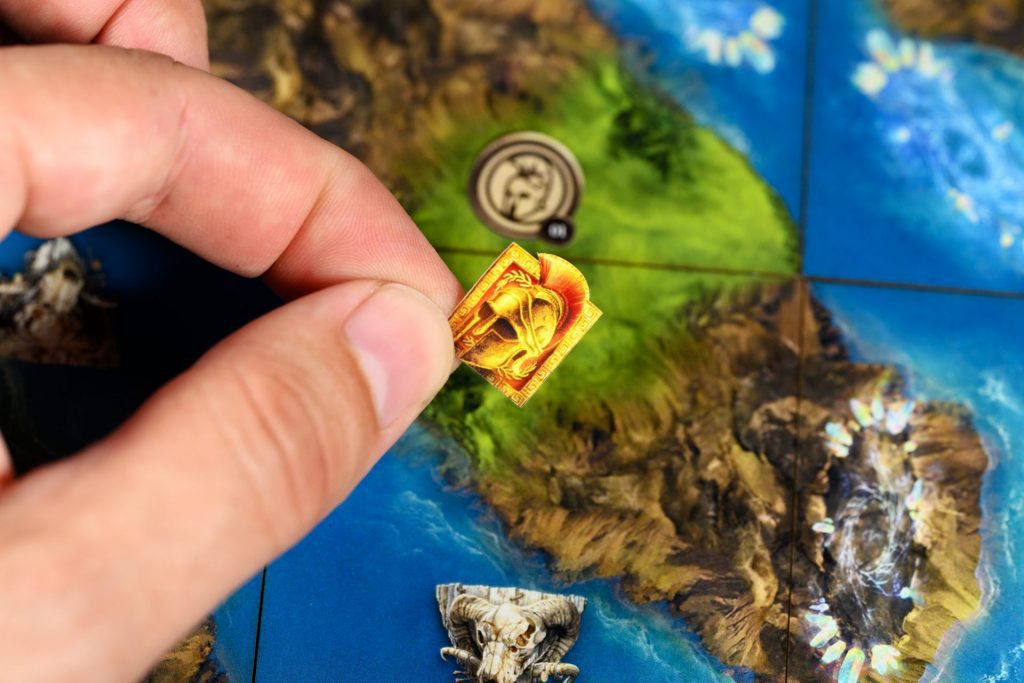
It changes the way you play. When a previously modified tile appears on the central board you find yourself torn between wanting to win the game and wanting to find out what’s happening at those sites you’ve influenced before. The narrative escapes the confines of the app, hanging in the air above the table in the headspace where the physical and the digital meet. This fusion of pixel and cardboard creates an impressively cohesive world despite the various landscapes being rearranged from game to game as tiles are placed in new arrangements. You feel a part of it.
The question of whether apps belong in board games feels utterly irrelevant when presented with this level of integration.
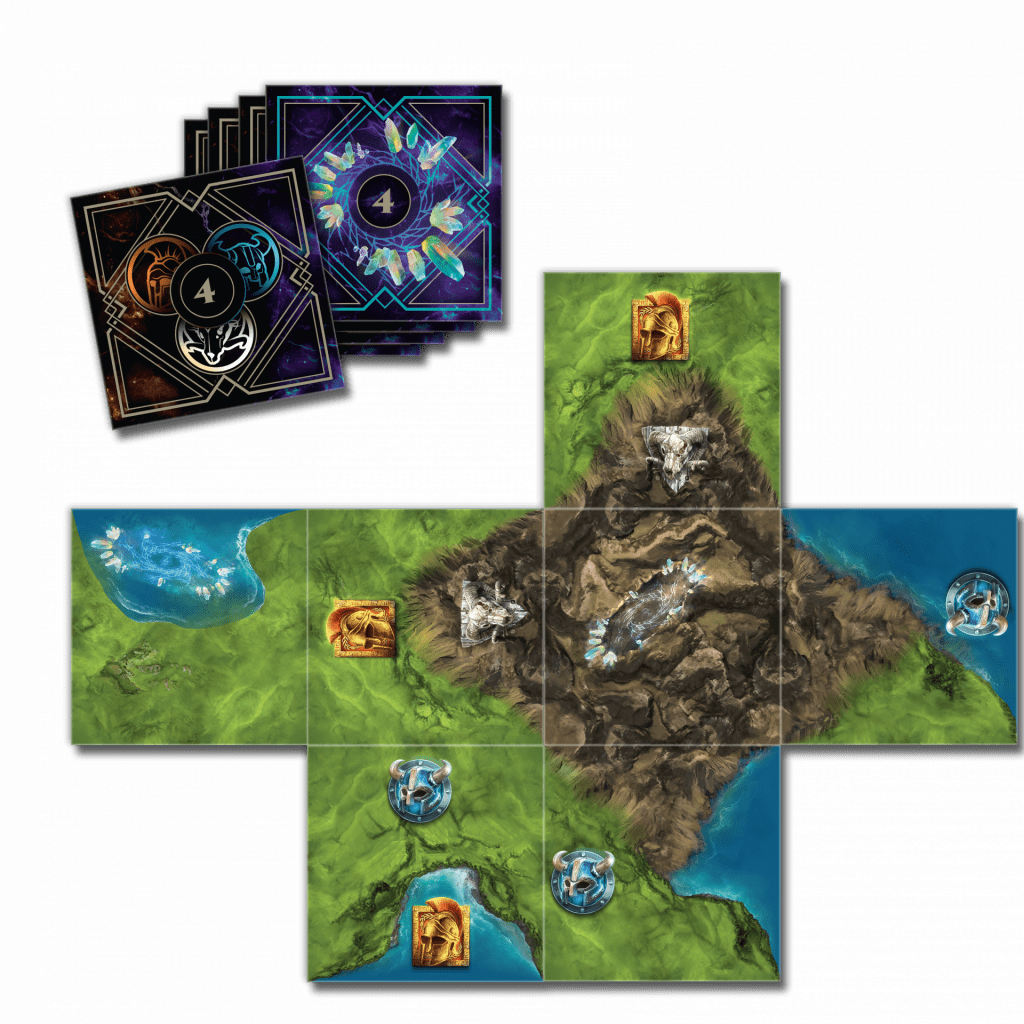
Given the copy I played was only a prototype it’s hard to comment on the level of production, although generally things are good. What I will say is that I went into our first game thinking that the tiles were a bit ugly – they seem overly large and a touch garish. But putting them together proved me wrong, the tiles blend together to produce a very appealing map.
It’s not perfect – you’ll be stopping play to refer to the app a lot. It’s far from a major problem but there are moments when it’ll happen on consecutive turns for no real reward, slowing the flow of the game as you wait for the previous player to log what they’ve done (by necessity the app tracks how far through some of the quests you are, which means logging each individual step).
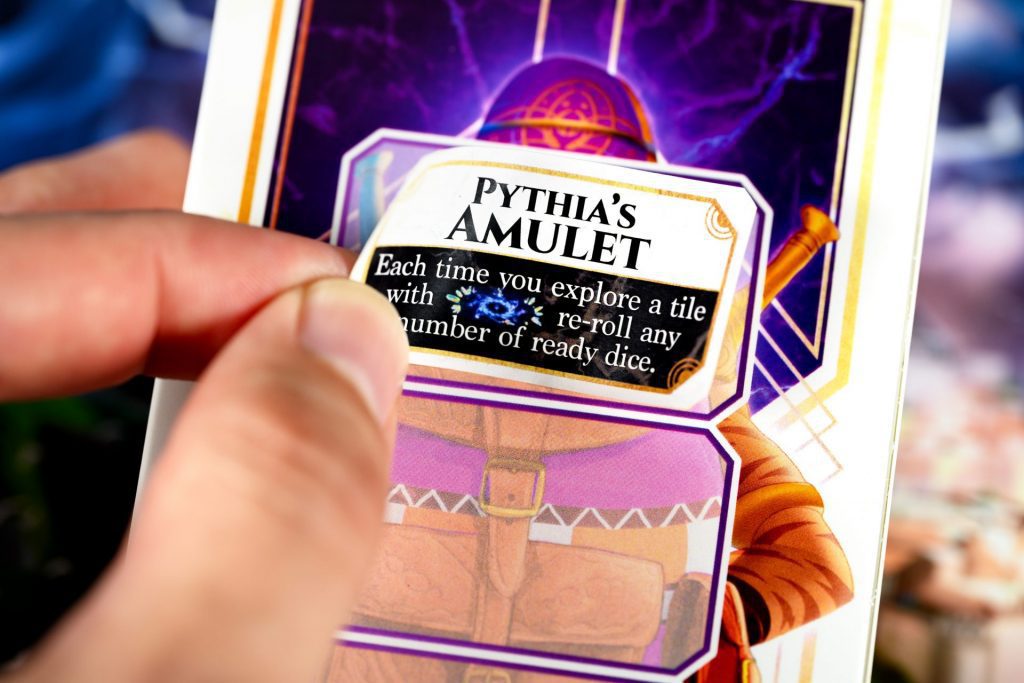
Those locations that you can visit are also a little hard to keep track of – they’re all beige circles with black line diagrams, easy to tell apart but trickier to remember from game to game which pantheon each is associated with or which player placed each sticker. This can make a difference to the outcome in terms of narrative or gameplay but in our second game I struggled to recall the exact details of the three locations we’d placed only the day before.
What Divinus also needs is a way of tracking who wins each individual game. At the moment the app and Favour tracks on your individual character tuckboxes provide you with a cumulative score across all scenarios but it would be nice to also separate the scores so that players know who won each individual game. In our second game the narrative seemed to suggest that I’d won but it was only when we went back and calculated where all the Favour points had been gained did we realise I’d actually come last. Not a major issue but something that would be nice to see in the final production.
In Summary
I’ve had a taste of Divinus and I’m genuinely excited by what designer Filip Miluński and Lucky Duck Games have in store, there’s so much potential for interesting mechanical and narrative developments across the 12 scenarios. Crucially even in just the first two scenarios there are plenty of moments where something new happens and you can’t help but let out a breath of appreciation as the boundaries of what you think may be possible suddenly expand out of sight. The prospect of having an infinitely replayable game doesn’t hurt either. Plus, it’s not often that you get to kill a god!


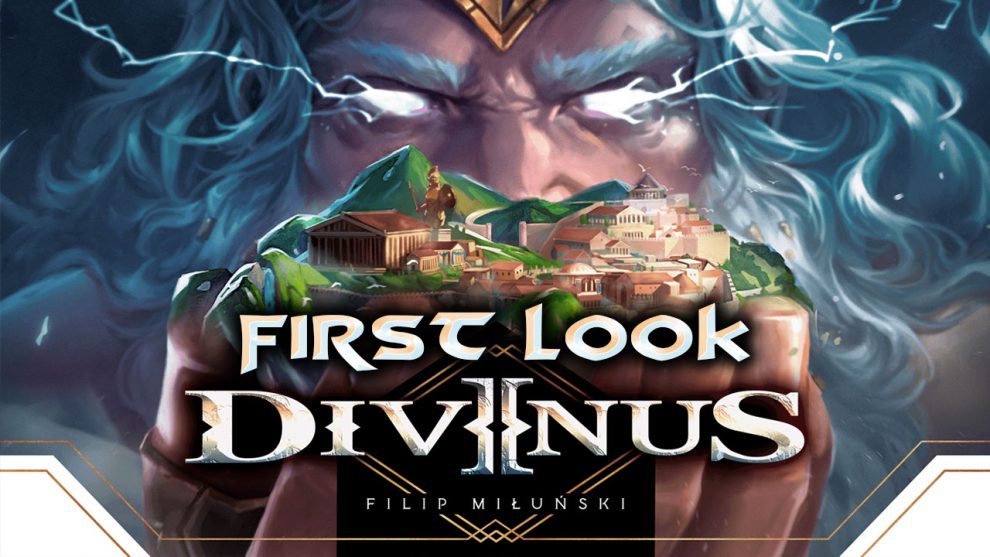








Add Comment